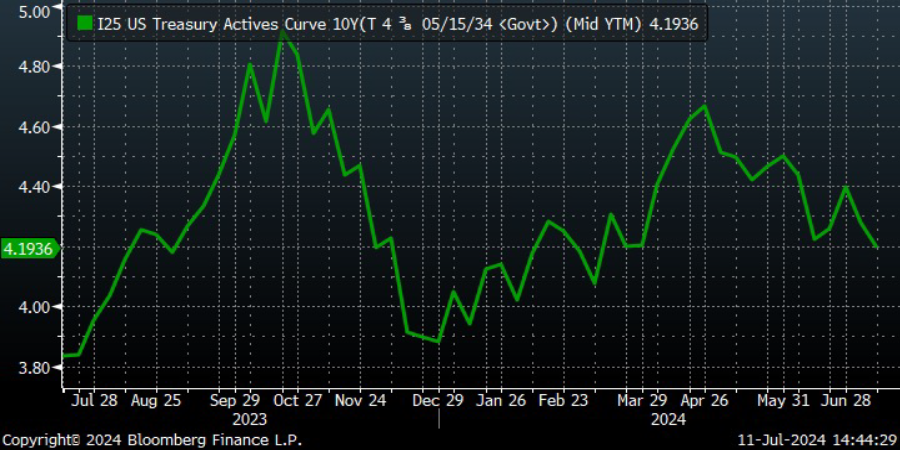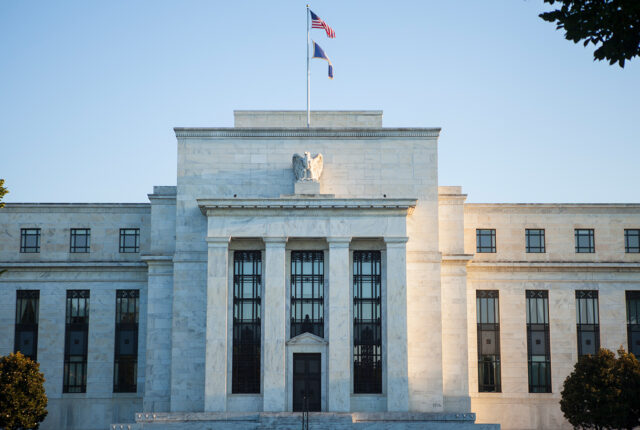
Interest Rate Game Plan
As we reach the midpoint of 2024, the economic landscape presents a mix of opportunities and challenges for investors. The topics on most investors’ minds are related to Interest Rates, Inflation, US Elections, Global Conflicts, US Economic Growth Prospects and how some or all of these issues will impact markets. Over the coming weeks, we will attempt to share our thoughts on each of these issues. After yesterday’s cool inflation print, we have decided to start with Interest Rate Outlook and how it could affect markets.
Our team has decided to focus on interest rates to guide how we shift our asset allocation within client portfolios in the back half of this year. Each client will have their own asset mix based on their own individual risk tolerance and objective. A fully invested Moderate-risk investor would be fully invested at 65% Equities and 35% Bonds/Cash. I will use that as an example as I explain our strategy.

We believe the sweet spot for interest rates on the 10-year US Treasury Bond is between 4.25%-4.75%. If we remain in the sweet spot, we recommend staying fully invested within your designed asset allocation.
- Favor Growth over Value
- Large Cap over Small Cap
- US over International
- Momentum over Pure Value
If the trend on interest rates breaks to the upside, we believe good economic news will become Bad News for stocks. Interest Rates approaching 5% have historically caused pensioners to sell stocks and buy bonds, which would put downward pressure on stocks. Above 4.75%, we recommend locking in higher rates by extending the duration of fixed income and investing cash in money market funds. Within equities, we recommend shortening the duration of equity portfolios by investing in dividend-paying stocks.
- Reduce growth and increase value.
- Large Cap over Small Cap
Bad News is Bad News, especially for the S&P500. This is our view based on the concentration of growth within this passive Index. Reduce cyclical sectors and favor value. Sectors such as Healthcare, Staples, Utilities, and Cost-Conscious Retail may be good places to invest. Take gains in Long Bonds and rebalance to equities.
The “Catch-Up” trade comes back into play. Our custom equal-weight portfolios should outperform within this environment.
- RSP or QQQE are workable exchange-traded fund ideas.
- Small Cap (SDVY) over Large Cap (SPY).
We will use the 10-year Treasury Rates to adjust our allocation recommendations because the markets set those rates. The Federal Reserve sets the Short-Term interest rates. Our belief on Short-Term rates is that the Federal Reserve will begin lowering rates this year (July or September and again in November/December). Therefore 5% cash will not always be 5% cash. To hedge against this possible downward move, investors can lock in 1-3 year interest rates by investing in CD’s, High Quality Corporates or US Treasuries.
As always, we are available to answer any questions you may have concerning your own personal needs and goals.
We hope everyone is enjoying their summer!
The S&P 500 is an unmanaged portfolio of specific securities, the performance of which is often used as a benchmark in judging the relative performance of certain asset classes. Investors cannot invest directly in an index. An index does not charge management fees or brokerage expenses, and no such fees or expenses were deducted from the performance shown.
BRM Investment Management (“Massey Romans Capital”) is an investment adviser registered under the Investment Advisers Act of 1940. The information presented in the material is general in nature and is not designed to address your investment objectives, financial situation or particular needs. Prior to making any investment decision, you should assess, or seek advice from a professional regarding whether any particular transaction is relevant or appropriate to your individual circumstances. Although taken from reliable sources, the Firm cannot guarantee the accuracy of the information received from third parties.
The opinions expressed herein are those of the Firm and may not actually come to pass.Author
Paul MasseyRelated posts
Forecasting the 2023 Market Outlook
While the Federal Reserve might have our backs in the case of an economic or fin
Housing Inflation
About 24% of the value of all those goods and services that make up the consumer
Federal Reserve Policy Shift
The Federal Reserve on 10/29/2025 signaled a Policy Change to the market that it


